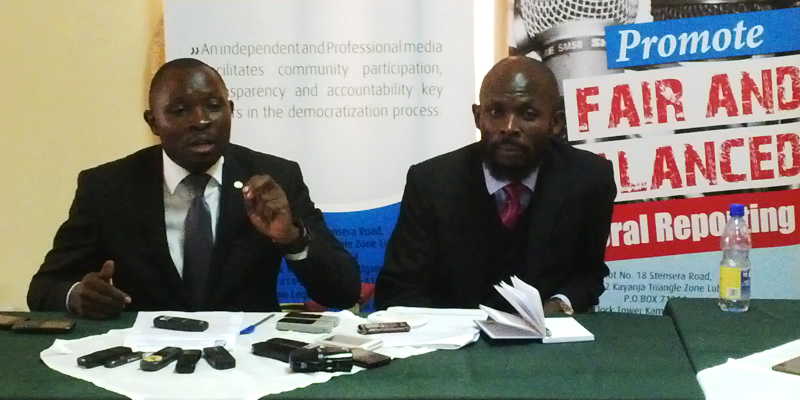News
Rights body condemns grilling of Editors by Parliament
The Human Rights Network for journalists-Uganda (HRNJ-Uganda) has condemned the move by the Parliament of Uganda to summon News Editors before its Rules and Privileges committee as unconstitutional and ‘a deliberate and calculated attempt to stifle democratic enjoyment of constitutional liberties of freedom of expression.’
About a fortnight ago, the Speaker of Parliament Rebeca Kadaga asked the Rules and Privileges Committee to investigate what she termed as inaccurate and malicious media reports by some outlets that suggested that Parliament spent up to 2 billions of tax payer’s money to facilitate travels of over 70 MPs to the United States to attend the Uganda North American Convention that took place at the beginning of September 2016 in Boston USA.
The media also reported that as a result of the trip, Parliament work was paralysed. This angered Kadaga who ordered for an investigation with the view to holding the media houses and editors with a colonial era offence of Contempt of Parliament.
HRNJ argues that: “We note that in resorting to this regressive legal inheritance of the offence of contempt of Parliament and parliamentary privileges is a very deliberate and calculated attempt to stifle democratic enjoyment of constitutional liberties, but also ring-fence Parliament from public scrutiny through the media.”
“Parliamentary privilege and contempt of Parliament are limited to protecting the legislative function expressly granted by the Constitution and therefore the present conduct of Parliament is a clear abuse of this power. It’s worth noting that Britain where this offence was inherited from last used this said law against the press in 1948 as it poses grave challenges to freedom of expression and democracy,” said Robert Ssempala, the Coordinator of HRNJ.
HRNJ-Uganda further notes that the underlying consequence of such developments is to further entrench self-censorship and choke free expression in Uganda.
“This tool is being used by Parliament to manipulate communication. The August house is drawing boundaries for the media on how and what to write or not. This trend of operation is very unfortunate; we denounce it in the strongest terms.”
MPs grill Editors
In response to the summons, only the New Vision Editors obliged with the call and the media house was represented by its Editor in Chief and News Editor Barbara Kaija and John Kakande respectively.
The meeting to which the media was banned from covering, turned into a trial, according to New Vision’s report as MPs grilled the editors to present evidence of the reports particularly on the Ushs2bn that was allegedly spend on MPs USA trip.
Vision’s Barbara Kaija instead asked Parliament to enact a law to create and fund an Independent Media Council.
But HRNJ’s Ssempala says that Kaija’s suggestion of a media council is already in stipulated under the Press and Journalists Act. But Ssempala points out that the Media Council lack legitimacy as its is not fully constituted and therefore remains a toothless dog. Several media practitioners have also questioned the independence of the media council.
Ssempala says: “The independence of the media from state control or government interference is fundamental in a democratic society that values freedom of expression and freedom of information.
He added: “The role of the media in Parliament is communicating parliamentary activities to citizens. This is essential in empowering the public and the media provides the conduit through which public opinions are communicated to members of Parliament.”
The concept of public interest lies at the heart of the debate surrounding the relationship between Parliament and the media; be it over legislation for the media sector or over conflict between the two institutions. A democratic society is one where citizens are exposed to all shades of opinion, regardless of whether this offends the sensibilities of some.”
HRNJ asked Parliament to do the following:
Respect the media as a legitimate reflection of public opinion, public concerns and social problems and reactions to policies and programmes.
Be accessible and honest in all dealings including explaining fully all policies to the news media rather than remaining detached and secretive, or attempting to manipulate or overly influence media coverage.
Facilitate more coverage of Parliament by opening the proceedings of select and other committees to the media.
Recognize the value of an independent media in contributing towards the development of a well-informed society through its exposure to a wide range of well-articulated views.
Appreciate that the media are also responsive to the people, serving as their watchdog in reporting the actions of Parliaments and governments.
Accept that lack of some privacy is a necessary price which public office holders must pay if a free media is to remain a bedrock of democracy.
Comments



















